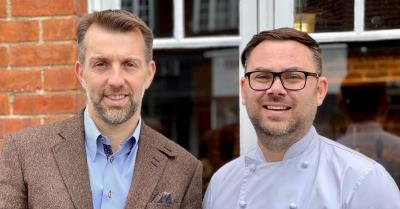26 Apr 2022

"You see so many young passionate talented people coming into our profession and for various reasons they leave prematurely, often because of the working environment, the way they're treated and how tough it can be."
Having worked in New York for celebrated restaurateur Danny Meyer, Simon believes that he's proof to the pudding that treating your teams well "is conducive to phenomenal success," and his own coming together with chef director Matt Larcombe stems from this shared belief.
But in order to reward members of their team for what they are truly worth, he said, businesses must offer more than just money. "It's about conditions, it's about treatment, it's about respect, it's about trust, it's about nurturing."
And though the compounding effects of the pandemic and Brexit are hurting the sector deeply, he continued, "in the long run, it's going to be much better for us, because we need to change the way that we approach things."
Beyond material benefits, which, at The Victoria include four-day working weeks, carefully planned nutritious meals and regular trips to meet with suppliers, there is something less tangible about what they are striving for, which is an organisation where passion and talent are given space to thrive.
Matt explained: "Over the years, you see young people, who, in their roles, mature and get that confidence about themselves. It's quite an amazing experience to see them grow up in that way, being able to teach them and help them develop as a person as well as in the industry."
"There are too many places that are solely focused on what they singularly want," Matt said, "and not necessarily what's good for the collective."
Though it is understandable given the circumstances, Simon sees it as problematic that employers are currently focused on hiring more than on retaining their staff.
For this reason, Simon explained, "our approach is per individual."
"We're taking a one-size-fits-one approach, so whether it's training or mentoring, it's what their needs are. Because when it feels personal, it already feels different."
For Matt, in the kitchen, an upending of the classical hierarchical structure is in order. He explained: "When we're doing development on new dishes, I don't want to do everything myself. I want everyone from the commis to the head chef to be working on developing new dishes because what will make that commis chef more proud - it might take them six months and the mentoring of me and senior chefs - than getting that dish onto the menu eventually?
"The industry doesn't always give that education to the younger chefs, but it's a great asset to have so you can build on their confidence and keep them engaged."
For both Matt and Simon, while many challenges lie ahead for the industry, so too do many opportunities.
"Hospitality is the second biggest employer in our country, so it's going to be massive," Simon said.
In the past, "small Michelin restaurants would have the same team for five-day weeks for consistency and would often close for Christmas and in the summer. It worked, because you would work together, you would be off together, you could plan things, you could programme maintenance.”
Not wishing to cast too strong a judgement, he said, "owners and directors got greedy and started to open more and more, and became 7-day week businesses.
"The energy and the effort required and the reward of that is marginal, and the only people lining their pockets were not the staff, which made it a short-sighted approach. I can see that coming back - back to a five-day week, where it is cleaner, better and for 5 percent less profit, you've got long-term stability.
"Success is definitely longevity. You do not want to be successful for three months, you want to be successful for years. I think that will come back, and it is already happening. That will help our profession."
"Some things that we did well in the past, we need to go back to - as well as reinventing ourselves and moving forward with more innovative ideas."